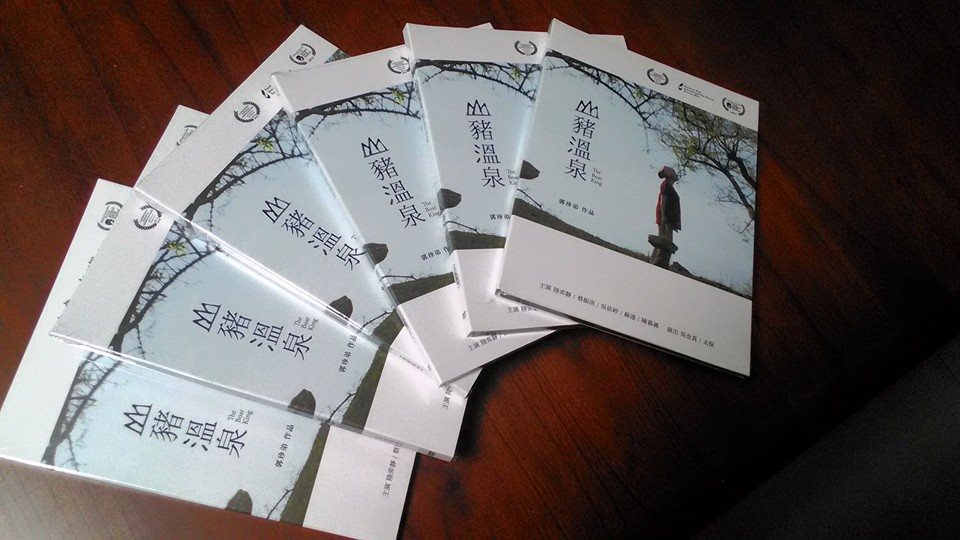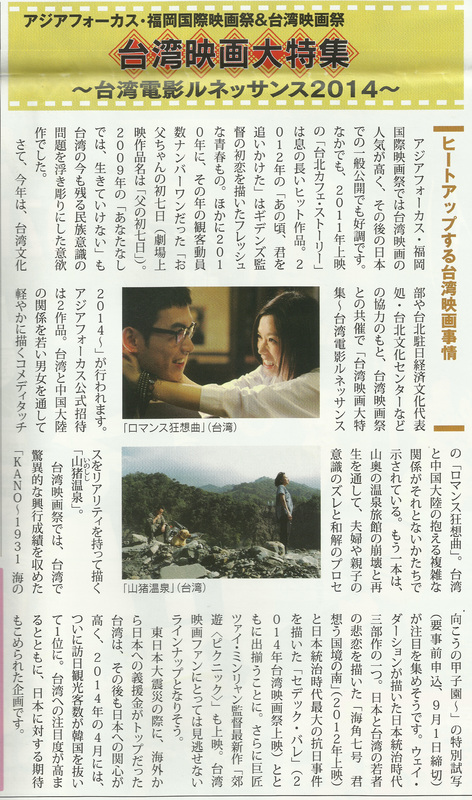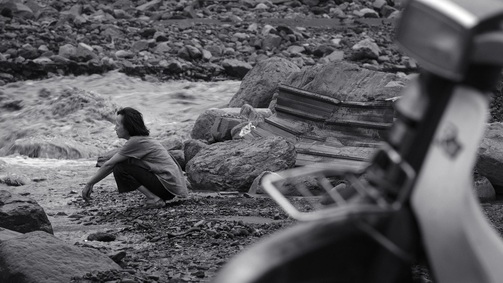Fünf Seen Filmfestival 2015 Germany
The Boar King in Fünf Seen Filmfestival
04.08.2015 19:30 in Kino Breitwand Starnberg - Reservieren
05.08.2015 17:00 in Breitwand Schloß Seefeld (Lounge) - Reservieren
The Boar King in Fünf Seen Filmfestival
04.08.2015 19:30 in Kino Breitwand Starnberg - Reservieren
05.08.2015 17:00 in Breitwand Schloß Seefeld (Lounge) - Reservieren
The Boar King DVD releases!
Buy your The Boar King DVD from Taiwan Women's Film Association
Contact information:
E-mail: [email protected] Address: 3F, No.16, Lane 10, Singcheng St., Taipei 10355, Taiwan TEL: +886 2 2557-5227
Please refer to the link for more details.
Contact information:
E-mail: [email protected] Address: 3F, No.16, Lane 10, Singcheng St., Taipei 10355, Taiwan TEL: +886 2 2557-5227
Please refer to the link for more details.
International Filmfestival Mannheim-Heidelberg
Introduction of The Boar King (German)
Introduction of The Boar King (German)
International Filmfestival Mannheim-Heidelberg
The Boar King - Screening Time
Screenings Heidelberg
Do 13. November 16.00 Kino im Schlossgarten I
Fr 14. November 22.30 Kino im Schlossgarten II
Sa 15. November 18.00 Kino im Schlossgarten I
Screenings Mannheim
Do 13. November 20.00 Kino Atlantis
Fr 14. November 18.30 Kino im Stadthaus II
Sa 15. November 22.30 Kino im Stadthaus II
The Boar King - Screening Time
Screenings Heidelberg
Do 13. November 16.00 Kino im Schlossgarten I
Fr 14. November 22.30 Kino im Schlossgarten II
Sa 15. November 18.00 Kino im Schlossgarten I
Screenings Mannheim
Do 13. November 20.00 Kino Atlantis
Fr 14. November 18.30 Kino im Stadthaus II
Sa 15. November 22.30 Kino im Stadthaus II

Article梁木ディレクターのここが見どころ!⑤ 【山猪(いのしし)温泉〈台湾〉】
災害から立ち上がる人々を応援する 心温まる人間ドラマ
(Article Link)
まず、奥深い山間部を襲う強力な台風のシーンから始まり、かなりリアルなのでドキュメンタリーではないかと思ってしまう。土砂崩れなどで村は崩壊状態。だんだんわかってくるのは、ここで小さな温泉を営む夫婦がいて、ビデオ撮影が趣味の夫は、台風を撮りに行ったきり戻ってこないこと。残された妻は途方に暮れる。温泉も出なくなり、ホテルの継続も難しい。この土地をどうすればいいのか? 地元を再生できるのか、それとも買いに来たデベロッパーに土地を売るのか……とまどいのなかで生きる人々、というとなんか普通ですけど、そうじゃない。
全編沈んだモノクロですが、死んだ夫が残したカラーのホームビデオが無造作に挿入されます。それがすばらしい。何の変哲もないホームビデオが、悲しいぐらい幸福に思えます。希望の見えない現在と、失われた幸福な過去。そこからどう立ち上がるのか? 地味ですが、いい作品です。
* Another Article Recommended:
THE FILM HIGHLIGHTS 10 “THE BOAR KING” (English Version)
A heartwarming human drama that offers a shower of support to victims of natural disaster…
災害から立ち上がる人々を応援する 心温まる人間ドラマ
(Article Link)
まず、奥深い山間部を襲う強力な台風のシーンから始まり、かなりリアルなのでドキュメンタリーではないかと思ってしまう。土砂崩れなどで村は崩壊状態。だんだんわかってくるのは、ここで小さな温泉を営む夫婦がいて、ビデオ撮影が趣味の夫は、台風を撮りに行ったきり戻ってこないこと。残された妻は途方に暮れる。温泉も出なくなり、ホテルの継続も難しい。この土地をどうすればいいのか? 地元を再生できるのか、それとも買いに来たデベロッパーに土地を売るのか……とまどいのなかで生きる人々、というとなんか普通ですけど、そうじゃない。
全編沈んだモノクロですが、死んだ夫が残したカラーのホームビデオが無造作に挿入されます。それがすばらしい。何の変哲もないホームビデオが、悲しいぐらい幸福に思えます。希望の見えない現在と、失われた幸福な過去。そこからどう立ち上がるのか? 地味ですが、いい作品です。
* Another Article Recommended:
THE FILM HIGHLIGHTS 10 “THE BOAR KING” (English Version)
A heartwarming human drama that offers a shower of support to victims of natural disaster…
 L to R: Chen-Ti Kuo, Yi-Ching Lu, I-Ting Wu
L to R: Chen-Ti Kuo, Yi-Ching Lu, I-Ting Wu
Focus On Asia Fukuoka International Film Festival 2014
- Q & A Session 2 “The Boar King” (Posted on 19 Feb 2015)
Featuring: Film Director Chen-Ti Kuo
Actress Yi-Ching Lu
Actress I-Ting Wu
Film: “The Boar King” (2013/Taiwan)
Q: The film was like solving a mystery of what happened to the father who went missing during the typhoon, by piecing together the home video footage in the motion picture with the rest of the film. I first want to thank you for making such a wonderful motion picture. The scene with the Chinese plum trees impressed me. In Japan, they blossom at the beginning of spring in February, but the film showed them blossoming during the winter. Also, the plum tree flowers were put afloat in the hot spring water in August. Now, when do these trees really blossom in Taiwan?
Film Director Chen-Ti Kuo: They blossom more or less towards the end of December. We shot the film just as we were preparing for the New Year. My direction impressed upon these trees to bring back memories of time spent with the father who died. I also gave these trees a spirit of encouragement, of going forward in life as best as you can in spite of disaster (such as a typhoon). I heard that after the typhoon struck in August, 2008, a dry spell of no rain lasted for a long time and that the fragrance of the plum flowers which blossomed in December were much stronger compared to the normal season. The villagers were saying “the plum trees must have been shocked at all the water damage to blossom so intensely.”
(Continue)
- Q & A Session 2 “The Boar King” (Posted on 19 Feb 2015)
Featuring: Film Director Chen-Ti Kuo
Actress Yi-Ching Lu
Actress I-Ting Wu
Film: “The Boar King” (2013/Taiwan)
Q: The film was like solving a mystery of what happened to the father who went missing during the typhoon, by piecing together the home video footage in the motion picture with the rest of the film. I first want to thank you for making such a wonderful motion picture. The scene with the Chinese plum trees impressed me. In Japan, they blossom at the beginning of spring in February, but the film showed them blossoming during the winter. Also, the plum tree flowers were put afloat in the hot spring water in August. Now, when do these trees really blossom in Taiwan?
Film Director Chen-Ti Kuo: They blossom more or less towards the end of December. We shot the film just as we were preparing for the New Year. My direction impressed upon these trees to bring back memories of time spent with the father who died. I also gave these trees a spirit of encouragement, of going forward in life as best as you can in spite of disaster (such as a typhoon). I heard that after the typhoon struck in August, 2008, a dry spell of no rain lasted for a long time and that the fragrance of the plum flowers which blossomed in December were much stronger compared to the normal season. The villagers were saying “the plum trees must have been shocked at all the water damage to blossom so intensely.”
(Continue)

Focus On Asia Fukuoka International Film Festival 2014
- A SYMPOSIUM ON FILMS FROM TAIWAN (Posted on 25 Mar 2015)
Coordinator: Yasuhiro Hariki (Festival Director,Focus on Asia International Film Festival Fukuoka)
Panelists:
Chun-yi Hsieh (Film Director of “Apolitical Romance”)
Chen-Ti Kuo (Film Director of “The Boar King”)
Po-Lin Chi (Film Director of “Beyond Beauty-Taiwan from Above”)
Chang Yann (University Professor and Film Critic)
......
Film Director Chen-Ti Kuo: Actually, “The Boar King” in its script phase was surprisingly a commercial comedy. But in the course of rewriting the script and as we continued our field work in the village, we began thinking that perhaps white collar workers in the city didn’t really understand the circumstances surrounding this mountain and life in the mountain village, that perhaps people in government weren’t understanding the real situation either and that perhaps there was quite a big gap between the two sides. And so the film became more realistic in this way as the script was rewritten over and over again, over a period of two years. And for this reason, getting funding for this film was really difficult. .......
(Continue)
- A SYMPOSIUM ON FILMS FROM TAIWAN (Posted on 25 Mar 2015)
Coordinator: Yasuhiro Hariki (Festival Director,Focus on Asia International Film Festival Fukuoka)
Panelists:
Chun-yi Hsieh (Film Director of “Apolitical Romance”)
Chen-Ti Kuo (Film Director of “The Boar King”)
Po-Lin Chi (Film Director of “Beyond Beauty-Taiwan from Above”)
Chang Yann (University Professor and Film Critic)
......
Film Director Chen-Ti Kuo: Actually, “The Boar King” in its script phase was surprisingly a commercial comedy. But in the course of rewriting the script and as we continued our field work in the village, we began thinking that perhaps white collar workers in the city didn’t really understand the circumstances surrounding this mountain and life in the mountain village, that perhaps people in government weren’t understanding the real situation either and that perhaps there was quite a big gap between the two sides. And so the film became more realistic in this way as the script was rewritten over and over again, over a period of two years. And for this reason, getting funding for this film was really difficult. .......
(Continue)
After the storm Kuo Chen-ti’s latest film looks at loss, pain and healing through a touching story inspired by Typhoon Morakot.
TAIPEI TIMES by Ho Yi / Link
Grief and healing take central stage in Kuo Chen-ti’s (郭珍弟) new film, The Boar King (山豬溫泉), which tells a deceptively quiet story of loss and rebirth inspired by the traumatic events when Typhoon Morakot devastated southern Taiwan in 2009. While it could have easily been made into a work of lachrymose sentimentality, the film thankfully doesn’t go in that direction. Instead, it looks at human suffering and pain with considerable restraint, buttressed by solid performances of Lu Yi-ching (陸弈靜) and Tsai Chen-nan (蔡振南).
Set in Baolai (寶來) in Greater Kaohsiung’s Liouguei Township (六龜), the film opens with home video footage of torrential flooding caused by Typhoon Morakot, as the off-screen cameraman witnesses the catastrophe in awe. The man’s name is Ying — played by Chen Mu-i (陳慕義) — who later disappears.
The widowed wife, Cho (Lu Yi-ching, 陸弈靜), is left with a hot spring lodge that barely survives the disaster. Seized by despair, Cho attempts and fails to commit suicide, having thought of her responsibility for Ying’s senile father, who lives with her. One day, Ying’s close friend Nan (Tsai Chen-nan, 蔡振南), a hunter, shows up at Cho’s door, offering to help rebuild the mountain inn. A reticent man, Nan has kept his tender feeling toward Cho for years.
Ying’s death also brings back Cho’s step-daughter Fen (Wu I-ting, 吳伊婷), who works mundane jobs in the city. Amid grief, she meets land surveyor Garmin, played by Soda Voyu from Seediq Bale (賽德克巴萊), and love starts to bud between the two.
Meanwhile, the villagers are forced to leave the devastated area, selling their homes to a resort development company. But one by one, they receive invitations sent by Ying before he died to a banquet set to be held at the inn. Perplexed, Cho looks to the home videos shot by her late husband, hoping to unravel the secret of his death.
Five years after her less than satisfactory debut feature Step by Step (練戀舞), Kuo has returned here with a finely executed and honest work filled with lyrical moments. The polished cinematography by Paotao (寶島) allows for the full expression of nature, whether a collapsed mountain slope, a riverbed studded with massive rocks, lush woods and hidden trails.
At times, sequences from the home videos shot by Chen’s character are inserted in and fused with the present narration, not only providing clues to the man’s thinking and his mysterious disappearance, but serving a link that enables the living to search for and reconnect with the dead and to come to terms with their grief.
The daughter’s reconnection with her father also raises the issue of land and homecoming. “The mountain road to home is no longer obstructed, don’t you think?” she says to her lover. However, much of the film’s failing lies in its rather flaccid effort to explore the young woman’s transformation. Her off-screen narration appears superfluous, adding nothing significant to the story, and theater actress Wu delivers the role with punctuated intensity that sometimes belongs to the stage rather than in front of the camera.
The crowning moments in The Boar King ultimately belong to veteran thespians Lu and Tsai. In a scene toward the end, Nan recounts an unforgettable encounter with a wild boar to Cho. We follow Nan’s resonant voice into the woods, where hot spring water flows, lives are intertwined and life quietly goes on.
Grief and healing take central stage in Kuo Chen-ti’s (郭珍弟) new film, The Boar King (山豬溫泉), which tells a deceptively quiet story of loss and rebirth inspired by the traumatic events when Typhoon Morakot devastated southern Taiwan in 2009. While it could have easily been made into a work of lachrymose sentimentality, the film thankfully doesn’t go in that direction. Instead, it looks at human suffering and pain with considerable restraint, buttressed by solid performances of Lu Yi-ching (陸弈靜) and Tsai Chen-nan (蔡振南).
Set in Baolai (寶來) in Greater Kaohsiung’s Liouguei Township (六龜), the film opens with home video footage of torrential flooding caused by Typhoon Morakot, as the off-screen cameraman witnesses the catastrophe in awe. The man’s name is Ying — played by Chen Mu-i (陳慕義) — who later disappears.
The widowed wife, Cho (Lu Yi-ching, 陸弈靜), is left with a hot spring lodge that barely survives the disaster. Seized by despair, Cho attempts and fails to commit suicide, having thought of her responsibility for Ying’s senile father, who lives with her. One day, Ying’s close friend Nan (Tsai Chen-nan, 蔡振南), a hunter, shows up at Cho’s door, offering to help rebuild the mountain inn. A reticent man, Nan has kept his tender feeling toward Cho for years.
Ying’s death also brings back Cho’s step-daughter Fen (Wu I-ting, 吳伊婷), who works mundane jobs in the city. Amid grief, she meets land surveyor Garmin, played by Soda Voyu from Seediq Bale (賽德克巴萊), and love starts to bud between the two.
Meanwhile, the villagers are forced to leave the devastated area, selling their homes to a resort development company. But one by one, they receive invitations sent by Ying before he died to a banquet set to be held at the inn. Perplexed, Cho looks to the home videos shot by her late husband, hoping to unravel the secret of his death.
Five years after her less than satisfactory debut feature Step by Step (練戀舞), Kuo has returned here with a finely executed and honest work filled with lyrical moments. The polished cinematography by Paotao (寶島) allows for the full expression of nature, whether a collapsed mountain slope, a riverbed studded with massive rocks, lush woods and hidden trails.
At times, sequences from the home videos shot by Chen’s character are inserted in and fused with the present narration, not only providing clues to the man’s thinking and his mysterious disappearance, but serving a link that enables the living to search for and reconnect with the dead and to come to terms with their grief.
The daughter’s reconnection with her father also raises the issue of land and homecoming. “The mountain road to home is no longer obstructed, don’t you think?” she says to her lover. However, much of the film’s failing lies in its rather flaccid effort to explore the young woman’s transformation. Her off-screen narration appears superfluous, adding nothing significant to the story, and theater actress Wu delivers the role with punctuated intensity that sometimes belongs to the stage rather than in front of the camera.
The crowning moments in The Boar King ultimately belong to veteran thespians Lu and Tsai. In a scene toward the end, Nan recounts an unforgettable encounter with a wild boar to Cho. We follow Nan’s resonant voice into the woods, where hot spring water flows, lives are intertwined and life quietly goes on.





